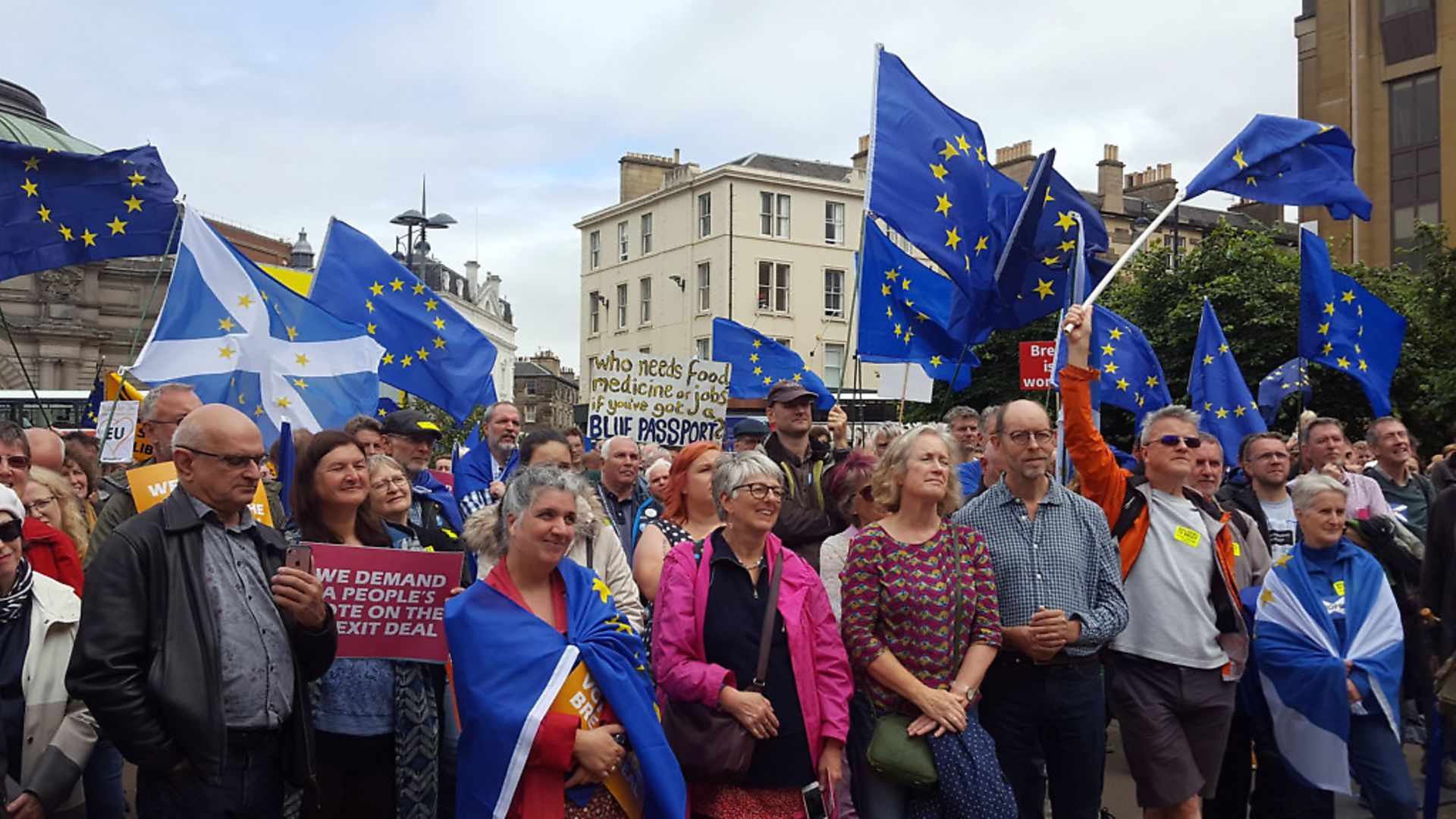
Mitch Benn on the danger of creeping optimism and the power of Scotland.
Something dangerous is creeping into our movement. Optimism.
Now don’t get me wrong, there’s nothing wrong with optimism. But like anything else that makes you feel good, you have to take it easy with optimism. A little bit will put a spring in your step and help you through the day; too much will really screw you up.
You can’t have failed to notice the casual nature with which the possibility of a final deal vote is being tossed into the public discourse these days. With every poll that’s published and every public figure who comes out of the People’s Vote closet, it becomes more of a possibility. So perhaps a bit of optimism is inevitable, and welcome.
But there’s something we’re forgetting. Even if the vote happens, in the immortal words of John Rambo, ‘Do we get to win this time?’
This is not a foregone conclusion. We can’t assume that the groundswell of Remainerism which will, necessarily, have brought the vote about, would be sufficient to carry the vote for our side.
And the thing which could pry open the jaws of victory to hand us another defeat is something which the London political and journalistic establishment so often forgets about.
Scotland.
The ‘Scottish question’ with regard to Brexit has been almost entirely overshadowed by the altogether more pressing ‘Northern Irish question’ and understandably so; no-one anticipates Brexit plunging Scotland into sectarian civil war. But while the sheer insolubility of the Northern Irish question may be one of the factors that brings a final deal vote about, the Scottish question, if we fail to address it (as, thus far, by and large we have) could yet lose us the vote should it happen.
I’m not suggesting that the Scots, who voted resoundingly for Remain in 2016, would suddenly vote for Brexit if asked now; what I’m afraid I can envisage is a scenario in which pro-independence Scots (most of them these days) either ignore or indeed boycott a final deal vote, as either irrelevant, or counter, to their interests.
How can we avert this? Well firstly and most importantly, we have to keep Scotland in the conversation. As a Scots/Scouse half-breed who spent his formative years living in Edinburgh (my mum was born in an army barracks in Inverness; her dad John Macleod was born on Harris in 1902 and didn’t even learn English until he moved to Glasgow as a teenager) I can tell those of you in England that what really winds the Scots up isn’t being oppressed or occupied so much as being ignored. So many decisions are high-handedly taken in London with nary a thought given to the repercussions in Scotland, however deafening those repercussions may prove to be.
So I’m addressing this column to my Scots half-brethren. Hello folks. Relax, I’m not going to do the accent.
For a start, you’re right; the result of the EU referendum utterly voids the result of the 2014 Indyref. The UK you (barely) opted to remain a part of was a UK firmly wedded to the EU for the imaginable future. And it’s worth repeating, for the benefit of our English readers, who rarely think about such things (understandably, they’ve got their own stuff to deal with) that the Conservatives haven’t been the highest-scoring party in Scotland in any election since 1955 and as such, for 34 of the last 63 years, you’ve been governed by a party you oppose (and which has, as often as not, treated you accordingly).
It’s inevitable therefore that for many of you, the priority is to get out of a union which exploits and/or forgets you, and achieve self-determination, and that the whole Brexit debacle – including our movement’s efforts to find a sane way out of it – is at best a distraction and at worst a perpetuation of a status quo you’re desperate to shrug off.
It doesn’t help that many of the people banging our pro-Remain drum north of The Wall are the ones who banged the ‘No’ drum back in 2014, and are perhaps tarred by this association, even if they weren’t party to what I know many of you regard as a deliberate shifting of the goalposts once the ‘Yes’ victory was in. (English readers, google ‘the Vow’ for some background on this: a promised post-referendum extension of devolved powers to Holyrood which subsequently failed to materialise; a disappointment – some say betrayal – keenly felt by the Scots but rarely, if ever, discussed south of the border.)
The concern – for our movement – is that you might decide that the best option for keeping Scotland in the EU is to let Brexit happen, use this to make the case for independence unanswerable (as it would be), cede from the UK (unilaterally if necessary) and apply for EU membership as a sovereign state. And I’ve got to say, you have a point.
If there is a People’s Vote, and you choose to sit it out, the English Remain vote may not be sufficient to win. So what positive case can our movement present to Scottish Remainers?
Well how about this: Yes, Scotland may be on an irreversible path to independence, and yes, you may well regard Brexit as an English problem best left for the English to deal with. But how much better would life truly be in an independent Scotland, if there were a hard border between still-EU Scotland and Brexited England?
Would not a brighter future for a free Scotland be one in which Brexit were averted, and a new ‘indyref’ called in due course? Scotland and England, separate states but equal partners in Europe would be a sustainable model. Scotland and England peering suspiciously at each other over barbed wire stretching from Berwick to Gretna Green would be an unending nightmare for both nations.
But these are questions that can only be answered together. So we’d better start asking them together.










